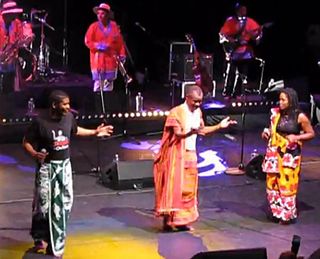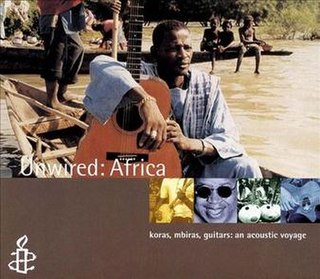
The highly diverse and distinctive music of Madagascar has been shaped by the musical traditions of Southeast Asia, Africa, Arabia, England, France and the United States over time as indigenous people, immigrants, and colonists have made the island their home. Traditional instruments reflect these widespread origins: the mandoliny and kabosy owe their existence to the introduction of the guitar by early Arab or European seafarers, the ubiquitous djembe originated in mainland Africa and the valiha—the bamboo tube zither considered the national instrument of Madagascar—directly evolved from an earlier form of zither carried with the first Austronesian settlers on their outrigger canoes.

In many parts of sub-Saharan Africa, the use of music is not limited to entertainment: it serves a purpose to the local community and helps in the conduct of daily routines. Traditional African music supplies appropriate music and dance for work and for religious ceremonies of birth, naming, rites of passage, marriage and funerals. The beats and sounds of the drum are used in communication as well as in cultural expression.
Tarika is a musical group from Madagascar. The group's predecessor, Tarika Sammy, formed in the 1980s, but as Tarika they debuted in 1993. At that point they had relocated to London. Their second album Son Egal was a collaboration with Senegal musicians and dealt with the 1947 Malagasy Uprising in Madagascar. Otherwise, much of Tarika's music is based on musical tradition; for example, the album D focused on dance music. Their 2001 album Soul Makassar dealt with the musical connections between Indonesia and Madagascar.

Salegy[ˈsaleɡʲ] is a popular music genre from Madagascar. Originating as a Sub-Saharan African folk music style in the northwestern coastal areas of Madagascar, modern salegy is the genre of Malagasy music that has gained the widest recognition and commercial popularity in the international market. Its sound is considered emblematic of the island. Eusèbe Jaojoby, a Sakalava singer from Anboahangibe, was a key originator of the style and is widely considered the "King of Salegy".

The culture of Madagascar reflects the origins of the people Malagasy people in Southeast Asia and East Africa. The influence of Arabs, Indians, British, French and Chinese settlers is also evident. The most emblematic instrument of Madagascar, the valiha, is a bamboo tube zither carried to the island by early settlers from southern Borneo, and is very similar in form to those found in Indonesia and the Philippines today. Traditional houses in Madagascar are likewise similar to those of southern Borneo in terms of symbolism and construction, featuring a rectangular layout with a peaked roof and central support pillar. Reflecting a widespread veneration of the ancestors, tombs are culturally significant in many regions and tend to be built of more durable material, typically stone, and display more elaborate decoration than the houses of the living. The production and weaving of silk can be traced back to the island's earliest settlers, and Madagascar's national dress, the woven lamba, has evolved into a varied and refined art. The Southeast Asian cultural influence is also evident in Malagasy cuisine, in which rice is consumed at every meal, typically accompanied by one of a variety of flavorful vegetable or meat dishes. African influence is reflected in the sacred importance of zebu cattle and their embodiment of their owner's wealth, traditions originating on the African mainland. Cattle rustling, originally a rite of passage for young men in the plains areas of Madagascar where the largest herds of cattle are kept, has become a dangerous and sometimes deadly criminal enterprise as herdsmen in the southwest attempt to defend their cattle with traditional spears against increasingly armed professional rustlers.
World Music Network is a UK-based record label specializing in world music.
Senge is an a capella vocal group from southern Madagascar. The group was formed as a male trio that performed the beko polyharmonic style of the Tandroy people, occasionally accompanied by an eight-piece acoustic band featuring traditional instruments, rhythms and harmonies.
Justin Vali ranks among the greatest living players of traditional Malagasy music on the valiha, a bamboo tube zither considered the national instrument of Madagascar. He also performs on the marovany box zither of central and southern Madagascar. Vali contributed to several compilations in the late 1980s before beginning to release his own albums in 1990. In 1994 he recorded Ny Marina at Real World Studios under Peter Gabriel's Real World Records. In 1999 he released The Sunshine Within, a collaboration with Paddy Bush. In 2008 he collaborated with Eric Manana and other prominent Malagasy artists to record an album as the Malagasy All Stars. Vali resides in Paris and performs regularly on the international world music festival circuit, including performances on several continents with the WOMAD festival. In 2006 he was awarded the Grand Prize for Traditional Music by Société des Auteurs Compositeurs et Editeurs de Musique, the French songwriters' guild.
Lego is a Sakalava musician who performs accordion music in the traditional style of the coastal regions of Madagascar. In addition to his acclaim as a musician, Lego is also known for having lost his sight as a child, and for being the half-brother of Malagasy superstar Rossy. Lego has released numerous albums and has toured regularly on the international world music circuit.
Wawa is a performer and composer of salegy, a genre of music from the northern coastal region of Madagascar. He is among the most popular contemporary salegy artists and has recorded songs in collaboration with numerous other Malagasy artists. In 2011 he released an album of traditional salegy, featuring kabosy, marovany and traditional percussion accompaniment. Wawa enjoys strong popularity among Malagasy audiences both domestically and within the diaspora, and regularly tours at home and abroad. In 2010 the band completed extensive tours to sold-out audiences in France and Madagascar. A music reviewer for Midi Madagasikara described Wawa in 2013 as the "perfect entertainer, who never ceases to perform at the highest levels."
Mily Clement is one of the originators of the contemporary form of salegy, a traditional musical style of the northern coastal areas of Madagascar. He grew up surrounded by the music of the tromba spirit possession ceremonies in his community, and in his teens he became influenced by American and African guitarists, inspiring him to begin playing guitar. He began professionally performing guitar with local bands in Ambilobe.
Mama Sana (1900–1997) was a Tandroy singer and performer of traditional airs on the valiha tube zither, the national instrument of Madagascar. She was a charismatic performer and dressed in traditional clothing with coins braided into her hair. Sana gained national and international acclaim over the course of her career, distinguished by her innovative reinvention of the valiha performance technique and her fusion of traditional Tandroy and Sakalava musical styles.

Olombelona Ricky, also known as Ricky, is a Malagasy vocalist and roots musician based in Antananarivo, Madagascar. Launching his musical career in 1991, Ricky recorded his first album in 1998, sparking the phenomenon of "Rickymania". His socio-political messages and uncompromising approach to his career have earned him a strong following among urban youth within Madagascar. He is esteemed as a musical and cultural ethnologist by many of his fellow Malagasy musicians for his effort to capture and reinvent the traditional musical heritage of the island and that of the near-mythical Vazimba people in particular, believed by many Malagasy to be the island's earliest inhabitants. Despite an uncompromising approach to his career which slowed his international exposure, Ricky has performed at numerous international music festivals over the course of his career and regularly tours at home and abroad.
Toto Mwandjani is a Malagasy guitarist and singer who performs the traditional musical genres of tsapiky and salegy infused with Ndombolo music of the Democratic Republic of Congo. Mwandjani, who was born in Antsohihy in north-west Madagascar, began playing guitar at age eight and formed a band called Les Jeunes Cobras. In 1994 he joined legendary group Feon'ala before becoming a high-demand musician at Studio Mars, the premier professional recording studio on the island. He formed the group Soley, gaining further acclaim for his unique adaptations of traditional musical styles. In the late 1990s after the dissolution of the band, Mwandjani was regularly invited to record and perform with the superstars of salegy, including Jaojoby, Mily Clément and Ninie Doniah. His single Malemilemy elevated him to national stardom. He has recorded two albums and toured extensively in Madagascar and Europe. Mwandjani has twice given concerts to represent Malagasy culture at the annual Days of Madagascar event held at UNESCO in Paris.
Ninie Doniah is a Malagasy singer and composer of salegy music that originates from the northern coastal area of Madagascar, including her birthplace of Nosy Be. She descends from a musical family: her grandmother was a celebrated singer of the traditional jijy vako-drazana antakarana.

Samoëla Rasolofoniaina, better known as Samoëla, is a Malagasy vocalist and composer of contemporary folk fusion and roots music that draws upon musical traditions throughout the island of Madagascar. He typically sings and plays acoustic guitar, accompanied by an ensemble including bass guitar, Western and traditional percussion, and backup singers. He is distinguished by his use of hainteny traditional poetry and its metaphorical language, as well as youth slang and culturally subversive direct language to critique and address sensitive social and political topics.
Tearano is a musical group from the southwestern region of Madagascar. They perform a contemporary form of the traditional beko genre, fusing southern vocal harmonies and tsapiky rhythms with modern instrumentation heavily featuring synthesizers and electric guitars. The band's innovative instrumentation modernized the tsapiky sound and rendered it more radio friendly and accessible to listeners in other regions of Madagascar. The band is considered an ambassador of the musical traditions of the south, and is credited with popularizing the tsapiky genre outside of the southern region of Toliara where it originated.

The Rough Guide To Acoustic Africa is a world music compilation album originally released in 2013 featuring acoustic music spanning Sub-Saharan Africa. Part of the World Music Network Rough Guides series, the album contains two discs: an overview of the genre on Disc One, and a "bonus" Disc Two highlighting griot Noumoucounda Cissoko. Disc One features artists hailing from Niger, Madagascar, the DRC, South Africa, Lesotho, Mozambique, Zimbabwe, Ghana, Cameroon, Mali, South Sudan, Sudan, Senegal, and Guinea. All but three tracks are guitar-based. The extensive liner notes were written by Daniel Rosenberg, and Phil Stanton, co-founder of the World Music Network, produced the album.

Unwired: Africa is a world music benefit compilation album originally released in 2000, with proceeds going to Amnesty International. Part of the World Music Network Rough Guides series, the release features African acoustic music, from traditional to pop. The compilation was produced and compiled by Phil Stanton, co-founder of the World Music Network. Catherine Steinmann wrote the liner notes.
Nicktoons is a children’s Arab pay television channel broadcasting to the Middle East & North Africa. Nicktoons was launched on 15 February 2017 and uses the UK version's on-air broadcast graphic package produced by Beautiful Creative. The channel is available on OSN.








